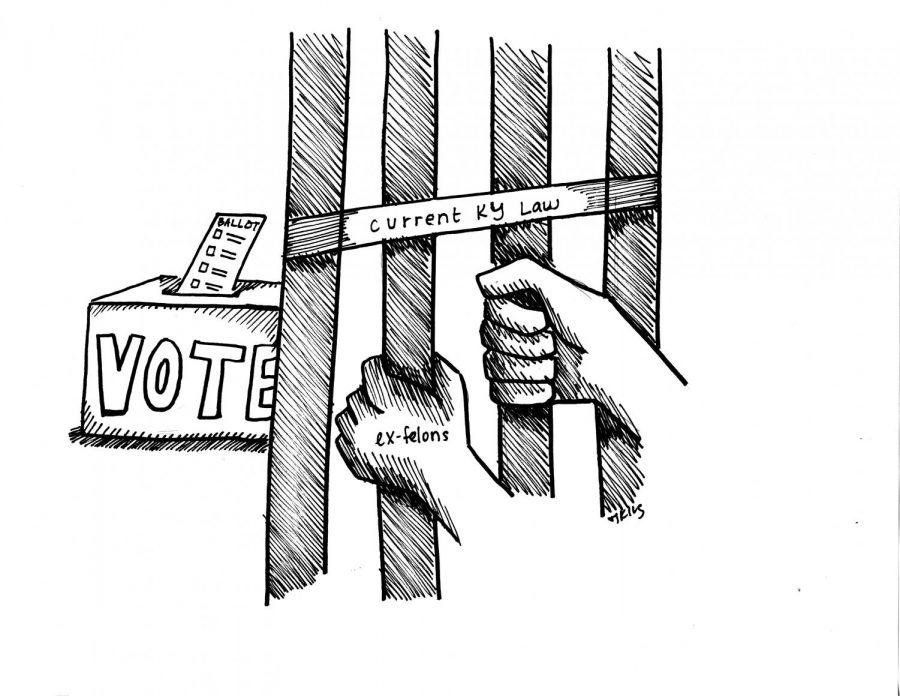Suffering Suffrage: Kentucky should automatically allow ex-felons right to vote
October 17, 2016
Suffering suffrage
The Issue: The Commonwealth of Kentucky, has the highest percentage in the nation of African-Americans who cannot vote because of felony convictions. We also have the third highest percentage in the nation overall of people who cannot vote due to felony convictions.
Our Stance: Gov. Matt Bevin made the restoration of voting rights a central part of his campaign, but he has yet to restore any since being in office. However, the fault does not lay solely at his feet. Several voices in Frankfort who could improve the situation are failing to do so.
Almost everyone can agree that voting is a cornerstone of our democracy, and now that the voter registration deadline has passed in Kentucky, the wheels of democracy have been properly oiled and are ready to propel us to the fateful day of Tuesday, Nov. 8.
But the wheels of the democratic process are not so easily operable for everyone in Kentucky. According to a report by the Sentencing Project, a nonprofit focused on criminal justice reform, an estimated 6.1 million Americans will not be allowed to vote next month because of state laws which bar people with past felony convictions.
In Kentucky, this translates to 9.1 percent of individuals experiencing disenfranchisement and 26.2 percent of African-Americans, the highest in the nation, left without a vote. The Sentencing Project notes that “felony disenfranchisement provisions have an outsized impact on communities of color.”
A report by the Courier-Journal found Bevin had yet to restore civil rights to a single person through his first 10 months in office, despite the support demonstrated during his campaign to restore rights to nonviolent felons who have completed their sentences.
In comparison, Democrat Steve Beshear issued an average of 1,190 civil rights restorations per year and Republican Ernie Fletcher averaged 277 restorations per year.
Bevin’s response to not paying attention to this matter was to deflect and blame the problem on former Governor Steve Beshear and Attorney General Andy Beshear; the latter, for distracting him with “a multitude of frivolous politically motivated lawsuits,” Bevin’s press secretary Amanda Stamper told the Courier-Journal.
Hopefully, Bevin’s office can one day learn to multitask between losing court cases and restoring people’s right to vote. Until then there’s very little people with felony convictions can do to have their rights restored. Per Section 145 of the Kentucky Constitution, only the governor can restore an individual’s civil rights, this includes suffrage.
Before Bevin took office, Steve Beshear filed an executive order to allow released felons to vote before his term ended. Bevin struck down Steve Beshear’s order and instead passed Kentucky House Bill 40 which would allow “felons the opportunity to submit for expungement five years after probation or the end of their sentence, whichever is the longest.” The bill came along with other guidelines such as a five-year gap and the crime be nonviolent in nature.
These guidelines, however, are still far from the standard for the rest of the country. In 38 states most ex-felons automatically gain the right to vote upon completion of their sentence, according to the National Conference of State Legislatures.
According to the Brennan Center for Justice, Kentucky is only one of three states (alongside Florida and Iowa) that permanently takes away suffrage from citizens with past criminal convictions. So at least we’re kind of in good company.
There have been efforts to bypass the need for an executive pardon. For example, this past legislative session produced Senate Bill 299 and House Bill 70. Senate Bill 299 is “we’ll get it next time” promise sponsored by Senate President Robert Stivers. It would change the Kentucky Constitution “to allow the state legislature next year to come up with guidelines on restoration of voting rights for non-violent felons,” according to the Herald-Leader.
In contrast, House Bill 70, upon voter approval would amend the constitution to automatically restore the “vote to all but those convicted of the most violent felonies, sex crimes, treason and election bribery, after they had completed their sentences.” However, this also comes as a meaningless gesture as the House has approved similar amendments in every session since 2007.
At this point we’re going down a checklist of both Republicans and Democrats who have consistently failed, or not pushed hard enough, to re-enfranchise the voting rights of convicted felons.
Even if Alison Lundergan Grimes, Kentucky secretary of state, works hard enough to roll out online voter registration for the state, what’s the vote if not everyone can even utilize this right? Accessibility to voting then becomes an empty promise if not everyone can, in fact, access it.
And the restoration of voting rights isn’t even a hot-topic partisan issue. Supporters include Senator Rand Paul, the American Probation and Parole Association, Kentuckians for the Commonwealth and the Catholic Conference of Kentucky to name a few.
Yes, Bevin isn’t currently making good on his promise to restore rights, but a minimum amount of work is being done to address this problem in the legislature as well. The fault to ensure people suffrage is then bipartisan in the state.
We expect more from our elected officials to ensure those who have carried out their sentences the right to vote, especially African-Americans who have been historically disenfranchised at the polls and continue to be in some states.
Kentucky should join the ranks of almost the rest of the United States and automatically give ex-felons the right to vote upon completion of sentence. Any state that willfully refuses to reinstate civil rights is showing a flagrant abuse of power.













